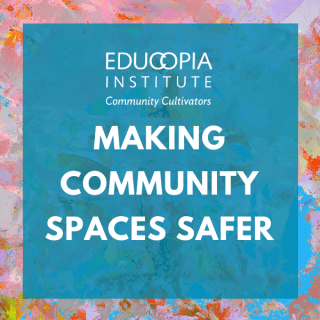
February 8, 2019
Making Community Spaces Safer…
By the Educopia Team: Hannah Ballard, Alex Chassanoff, Jessica Farrell, Sam Meister, Jessica Meyerson, Caitlin Perry, Melanie Schlosser, Katherine SkinnerWe deserve a better organization. We deserve a better profession. What happened to me and what happens to so many others cannot be allowed to continue. – April Hathcock “ALAMW: What Happened, and What Should Happen Next”
All of us at Educopia have been actively grappling with the recently reported ALA Midwinter 2019 Code of Conduct breach and verbal assault on April Hathcock, as well as the news of other such incidents at the conference. (Read April Hathcock’s posts about the assault and its aftermath.)
The attack, and perhaps especially the reported silent complicity of those that witnessed the attack, has compelled our team to reassess our responsibility as hosts and facilitators of a wide variety of both physical and virtual community spaces.
We know that all of us–meaning, the full spectrum of facilitators, hosts, speakers, and attendees across our field–are called to see, to hear, to recognize, and to intervene when people are violated in our community spaces. These violations happen all the time, not just in these rare moments when a violation is publicly acknowledged and discussed.
We also know that we–personally, as eight people within this field–don’t always see, hear, recognize, and intervene when a violation occurs, no matter how much we intend to do so. It’s important to us to formally acknowledge that we-at-Educopia are neither above nor beyond this, and that we’re trying to attend to the ways that our own privilege(s), especially when unacknowledged, can lead us to be unwitting accomplices to violations that happen on our listservs, in our in-person gatherings and events, during committee meetings, and in governance teams.
As a team, we recognize the inherent limitation of Codes of Conduct: they are statements of intention and procedures, not hard boundaries that automatically prevent infraction, and even comprehensive and well-structured Codes can fail at the enforcement stage. Codes of Conduct are an important step in cultivating accessible, safe communities, but they can’t create that space on their own. All members of the community must contribute to the cultivation of safer spaces – it can’t be just the leadership or just the same few people already deeply engaged in this work. Most of our field’s communities are not at the stage yet where the everyday culture aligns perfectly with the Code of Conduct. Fieldwide, we have to do specific and intentional work to get there – and it’s time to prioritize that work.
At Educopia, all of us are publicly committing, both individually and as a team, to invest additional time and energy in specific ways to address oppression, aggression, and inequality in our community environments – beyond the Codes of Conduct and other mechanisms that we already have in place. We’ve started this work with a set of internal conversations about what prioritizing this work means and what concrete actions we can take and hold ourselves accountable for.
We’ve determined that right now, we can and will undertake the following concrete actions:
- Dedicate time to research and synthesize methods and mechanisms that other communities (including in other fields) use to cultivate and maintain safety for all community members (February-June 2019, with weekly time scheduled for both research and staff discussions about what we’re learning and how we can communicate that out beyond our team later this spring).
- As part of this research, we will listen to and learn from our colleagues who have spoken and written about their experiences. We will also invite members of Educopia’s Affiliated Communities to share examples of times they have felt and/or been particularly safe or unsafe in professional spaces, and we will work together with our members to continually improve our environments.
- Articulate our values as an organization and identify concrete tools and strategies to live into those values and cultivate them within our affiliated communities (we’ll publish these after our July 2019 retreat).
- Explore opportunities for collaborative work with other communities to foster equitable and safe community spaces fieldwide. We are actively seeking ways to contribute to, partner with, and support organizations that are already leading field-level transformation in these areas.
We appreciate that many people within our field do prioritize this work, taking regular, meaningful action to confront white supremacy and systemic inequities in community spaces. We want to thank all those who are already leading the charge, especially those facilitators and community members across the field who regularly acknowledge, discuss, and fight the ways that privilege, bias, power, and discrimination function within and shape our experiences. We want to amplify and help extend that work.
Educopia’s staff believes that there is a unique role for community facilitation to play in this work, and we are committed to pursuing this work in conscious and ongoing ways.